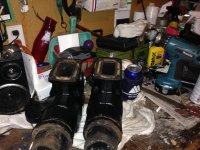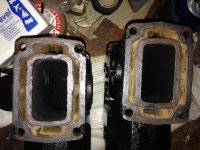What is the expected useful life I/O Exhaust Riser life in Fresh Water environment? I'm on my third I/Opowered boat and 99.9 % of there marine environment has been in fresh water lakes
We never replaced one but my previous boat, '95 Sea Ray with Mercruiser 5.7l Bravo 1 had results from oil test that indicated significant levels of water combustion by products in the oil. That engine was 23 yrs(650 hrs) old at time of test. So it was probably due to failing risers? Engine always ran well.
We never replaced one but my previous boat, '95 Sea Ray with Mercruiser 5.7l Bravo 1 had results from oil test that indicated significant levels of water combustion by products in the oil. That engine was 23 yrs(650 hrs) old at time of test. So it was probably due to failing risers? Engine always ran well.





















